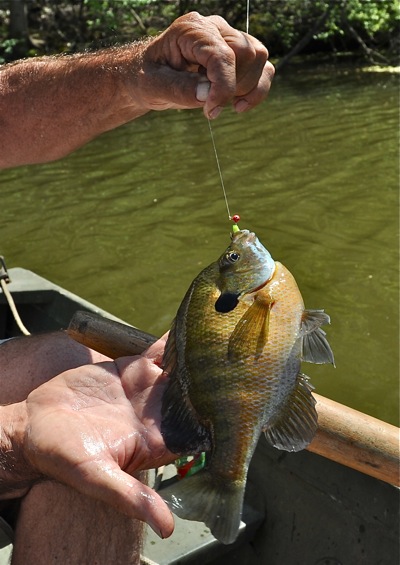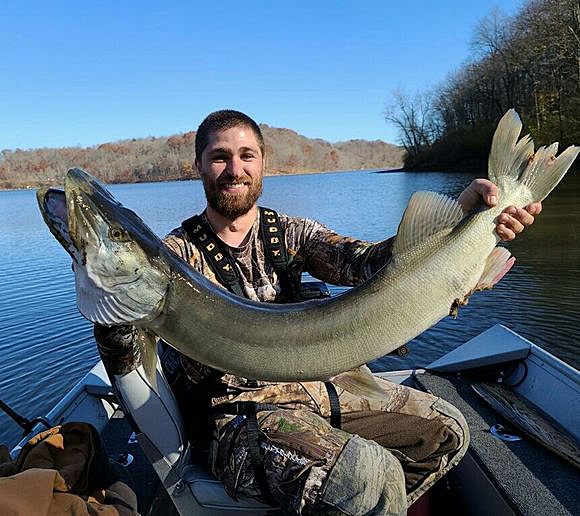If you have a farm pond hookup it’s a great place to learn, teach, and enjoy the simplest pleasures of fishing. And, you can help a landowner improve his resource.
By Ray Reilly for Press Pros Magazine
 In Part 1 of this I talked about some of the ways you can screw up a good farm pond relationship with a landowner.
In Part 1 of this I talked about some of the ways you can screw up a good farm pond relationship with a landowner.
To review, don’t take other people into his property, regardless of how hard they beg you to take them fishing. Bottom line, you have to respect the landowner and his property, and accept that some people will take advantage of a good thing like convenient fishing, and before you know it they’re going in without you knowing about it.
But in this article I’m going to share why farm pond fishing is such a blessing to have, once you have it.

Bluegills in a farm pond provide easy pickins’ for bait and bobber fishing.
One, it’s an easy place to teach a youngster how to fish, and how to respect the resource. Most are small enough to conveniently fish from the bank. Most are well-stocked with bluegills and bass, and the bluegills provide easy pickins’ for bait and bobber fishing. This is where you learn to bait a hook with a nightcrawler, and how to unhook a squirming fish without getting stuck by a dorsal fin.
Two, it’s an easy place to teach a young fisherman about pond and water structure, and how the smaller fish will be those closest to the surface and the shoreline. They are the bottom of the food chain, looking for any kind of meal they can find. The bigger, more experienced fish will typically be in deeper water, and preying off some of those same smaller fish. Thereby, it’s important to know about the depth and any kind of cover beneath the surface where bigger fish may be hanging out. Catching four-inch fish is fine for starters, but it doesn’t take long before you get bored with it – develop a taste for something bigger.
That’s just the fishing part of it, because farm ponds are also a great opportunity to cooperate with the landowner to improve pond management. Let me explain.
For years I fished a pond in northeast Ohio where the landowner made it very plain that he didn’t want ANY fish removed and taken out, even bluegills. The problem is, if you do long enough it becomes overpopulated with small fish, making it nearly impossible to catch bigger fish, upsetting the healthy balance of the pond…especially ponds that are less than an acre in size. Do it long enough and you won’t have ANY bigger fish!
Ultimately I convinced him, and we began taking smaller bluegills out by the bucketfuls, using them for, among other things, fertilizer around plants and shrubs. Bury fish remains around roses and you’ll soon have the healthiest foiliage and the biggest blooms you’ve ever seen. But bury them at least six inches deep, and keep an eye out for neighborhood cats.
 Within a year you could see a difference in the pond’s population of catchable fish. I began to catch more bass on artificial worms and crank baits. Topwater lures became more enticing and effective. The whole experience of pond fishing became better because the balance of the pond had been improved. Again, emphasizing that this is important with smaller ponds, less than an acre.
Within a year you could see a difference in the pond’s population of catchable fish. I began to catch more bass on artificial worms and crank baits. Topwater lures became more enticing and effective. The whole experience of pond fishing became better because the balance of the pond had been improved. Again, emphasizing that this is important with smaller ponds, less than an acre.
At that point you could accurately cast into the deeper depths of the water, around submerged brush and a couple of protruding tree stumps, and expect to get some action. Just two years earlier, those bigger bass (and even bluegills) had all the food they wanted and rarely struck a lure or baited hook. The landowner was impressed, convinced that our fishing relationship was actually improving his property assets.
Again, ponds represent a special kind of fishing apart from larger bodies of water. I think of them as the 7-Eleven of fishing holes, more convenient than lakes and rivers, and because they’re smaller they’re less intimidating to beginning fishermen. It’s the same kind of ecosystem, though, so it’s important to remember that because of size it can get out of whack more quickly.
On bigger bodies of water some people stock with crappies, because crappies have proven good in controlling the population of too many bluegills. Crappies eat minnows, grow quickly, and where there’s adequate structure they offer another great fishing resource, especially in water greater than one acre. Crappie fry are also a great food source for bass, an even bigger win-win. I know of one two-acre body of water that yields 12-inch crappies at peak times of the year, and there is no better fishing anywhere, but again…it must be respected and properly managed.
You can help create good fishing like this if you take the time to do all the right things. Ask respectfully…don’t take other people in to fish…develop the relationship and trust of the landowner…and always leave a pond in better shape than you found it. It works!
I’ve enjoy it. ‘Til next time….


